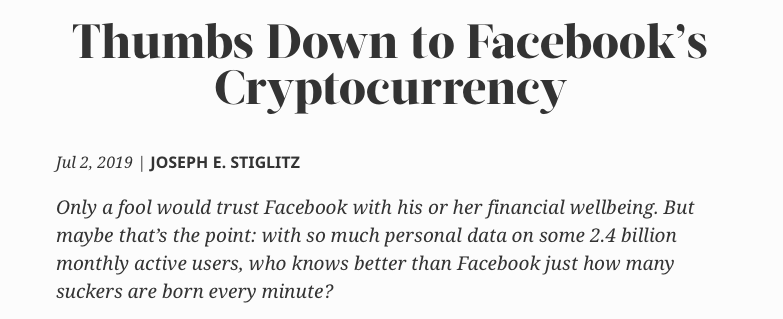|
Sir Kim Darroch เอกอัครราชทูตอังกฤษประจำกรุงวอร์ชิงตันดีซีรายงานกลับกรุงลอนดอนว่ารัฐบาลโดนัลด์ ทรัมป์ไม่มีคุณภาพ ทำงานไม่เป็น และอาจจบลงอย่างน่าเวทนา เอกสารการสื่อสารส่วงกลับอังกฤษนี้รั่วออกสู่หนังสือพิมพ์ The Mail ยังผลให้เกิดการตอบโต้ ด่าว่าและเสียดสีกลับจากโดนัลด์ ทรัมป์ พฤติกรรมของโดนัลด์ ทรัมป์ ล่าสุด ยืนยันความจริงตามที่รายงานโดย Sir kim Darroch และเป็นไปตามที่โลกมองเห็นอยู่แล้วก่อนหน้านี้ ปัญหาก็คือทูตอังกฤษเตือนว่าทรัมป์อาจกลับมาเป็นประธานาธิบดีได้อีกในสมัยที่สอง READ ALL ABOUT IT
Joseph E. Stiglitz:
คนโง่เท่านั้นที่จะไว้ใจ Facebook เรื่องเงิน ศาสตราจารย์ Joseph Stiglitz นักเศรษฐศาสตร์รางวัล Nobel บอกว่า เงินตราแบบ digital crypto currency สกุล Libra ที่จะเสนอให้บริการโดย Facebook กับบริษัทพันธมิตรทางการเงินหลายรายนั้น ไม่น่าไว้ใจ Facebook เองโดยเฉพาะ ก็มีประวัติเสีย ไม่น่าไว้วางใจในการเก็บรักษาข้อมูลความลับของลูกค้าสมาชิก ในขณะที่ธนาคารและสถาบันการเงินต่างๆในโลกวันนี้ล้วนมีความมั่นคงเชื่อถือได้และสะดวกในการใช้บริการอยู่แล้ว ดังนั้นคนโง่เท่านั้นที่จะหลงเชื่อฝากอนาคตทางการเงินไว้กับ Facebook แต่ Facebook ก็รู้ดีว่า คนโง่นั้นเกิดใหม่ทุกนาที นับดูคนโง่ 2.4 พันล้านคนในโลกที่ใช้ Facebook อยู่ทุกวันนี้ก็เห็นชัดเจน. JOSEPTH STIGLITZ on PROJECT SYNDICATE |

องค์การสหประชาชาติ
Global Issues Overview 🌏 ภาพรวมปัญหาโลก As the world’s only truly universal global organization, the United Nations has become the foremost forum to address issues that transcend national boundaries and cannot be resolved by any one country acting alone. To its initial goals of safeguarding peace, protecting human rights, establishing the framework for international justice and promoting economic and social progress, in the seven decades since its creation the United Nations has added on new challenges, such as climate change, refugees and AIDS. While conflict resolution and peacekeeping continue to be among its most visible efforts, the UN, along with its specialized agencies, is also engaged in a wide array of activities to improve people’s lives around the world – from disaster relief, through education and advancement of women, to peaceful uses of atomic energy. This website offers an overview of some of these issues in depth, and links to other resources where you can get additional information. องค์การสหประชาชาติเป็นองค์การเดียวของมนุษย์ในโลกที่มึสถานภาพและบทบาทหน้าที่รับผิดชอบในการทำงานร่วมกันในระดับโลกเป็นสากล เป็นเวทีของการแก้ปัญหาข้ามพรมแดนประเทศ อันเป็นเรื่องที่ไม่สามารถจะจัดการโดยประเทศหนึ่งประเทศไดได้โดยลำพัง โดยการยึดมั่นในเป้าหมายแต่แรกเริ่มกำเนิดขององค์การสหประชาชาติในการ ปกป้องสันติภาพ, คุ้มครองสิทธิมนุษยชน, สร้างกรอบแห่งความยุติธรรมระหว่างประเทศ, และส่งเสริมความก้าวหน้าทางเศรษฐกิจและสังคม. ตลอดช่วงเวลา 70 ปี นับแต่กำเนิดองค์การสหประชาชาติ ก็มีความท้าทายใหม่ๆเกิดขึ้น เช่นปัญหาการเปลี่ยนแปลงของสภาวะภูมิอากาศโลก (climate change), ปัญหาผู้อพยพลี้ภัย. และโรค AIDS"' ในขณะที่เรื่องการแก้ปัญหาความขัดแย้ง และ การรักษาสันติภาพระหว่างประเทศ ยังคงเป็นงานหลักและงานหนักของสหประชาชาติต่อไป ท่ามกลางความพยายามอันยิ่งยวดในการคลี่คลายปัญหาสำคัญอื่นๆโดยหน่วยงานสาขาที่มีงานพิเศษเฉพาะทางต่างๆภายใต้องค์การฯ การทำงานสารพัดเรื่องที่จะช่วยให้ชีวิตมนุษย์ดีขึ้นก็มิได้หยุดยั้ง - ตั้งแต่เรื่องการให้ความช่วยเหลือในยามเกิดวินาศภัย, เรื่องการศึกษา, เรื่องความก้าวหน้าของสตรี, ตลอดจนเรื่องการใช้พลังงานอะตอม (นิวเคลียร์๗ เพื่อสันติประโยชน์. ใน website ขององค์การสหประชาชาติ มีเรื่องเหล่านี้โดยละเอียดลึกซึ้ง รวมทั้งการเชื่องโยงข้อมูลต่อไปยังแหล่งข่าวสารสำคัญต่างๆ ตามความสนใจของมนุษย์ผู้อ่าน สำหรับที่ THAIVISION นี้ เราเริ่มต้นที่บทสรุปหน้าแรกว่าด้วย Global Issues หรือประเด็นปัญหาสำคัญของโลก รวม 21 เรื่อง (เรียงตามลำดับอักษร A-Z) จากนั้นท่านสามารถเชื่อมต่อข้อมูลต่อไปได้: 21 GLOBAL ISSUES 1. Africa | แอฟริกา The UN system plays a crucial role in coordinating assistance of all kinds — to help Africa help itself. From promoting the development of democratic institutions, to the establishment of peace between warring nations, the UN is present on the ground supporting economic and social development and the promotion and protection of human rights. สหประชาชาติพยายามช่วยเหลือประเทศในแอฟริกาให้ช่วยตัวเองได้สารพัดรูปแบบและวิธีการ ตั้งแต่เรื่องการส่งเสริมการพัฒนาสถาบันการเมืองต่างๆอันเป็นรากฐานของระบอบประชาธิปไตย ตลอดไปจนถึงเรื่องการสร้างสันติภาพจากสงครามและความชัดแย้งระหว่างชนต่างเผ่าพันธุ์ระหว่างประเทศในทวีปแอฟริกา, การพัฒนาเศรษฐกิจและสังคม, การส่งเสริมและปกป้องสิทธิมนุษยชน. สหประชาชาติทำงานโดยมีเจ้าหน้าที่และตัวแทนในพื้นที่ต่างๆ 2. Ageing | ประชากรอายุยืนยาว The world’s population is ageing: virtually every country in the world is experiencing growth in the number and proportion of older persons in their population. The number of older persons, those aged 60 years or over, has increased substantially in recent years in most countries and regions, and that growth is projected to accelerate in the coming decades. ประชากรโลกนับวันจะมีจำนวนผู้สูงอายุที่อายุมากกว่า 60 ปีขึ้นไปมากขึ้นในเกือบทุกประเทศ และประมาณการว่าจำนวนประชากรสูงอายุจะเพิ่มมากขึ้นเรื่อยๆในอีกหลายทศวรรษข้างหน้า 3. AIDS | โรคเอดส์ New HIV infections have fallen by 35% since 2000 (by 58% among children) and AIDS-related deaths have fallen by 42% since the peak in 2004. The global response to HIV has averted 30 million new HIV infections and nearly 8 million AIDS-related deaths since 2000. The UN family has been in the vanguard of this progress. อัตราการเกิดติดเชื้อ HIV ลดลง 35% หลังจากปี 2000 HIV ในเด็กลดลง 58% และจำนวนผู้เสียชีวิตจาก AIDs ลดลง 42% หลังจากขึ้นสูงสุดปี 2004 การตื่นตัวของโลกในการต่อต้านโรค AIDs ทำให้สามารถหลีกเลี่ยงผู้ติดเชื้อใหม่ได้ 30 ล้านคน และหลีกเลี่ยงการตายจากการติดเชื้อ HIV AIDs ได้เกือบ 8 ล้านคน นับจากปี 2000 UN ทำงานเรื่องนี้อย่างเต็มที่ 4. Atomic Energy | พลังงานอะตอม More than 30 countries worldwide are operating 444 nuclear reactors for electricity generation and 66 new nuclear plants are under construction. In 2014, 13 countries relied on nuclear energy to supply at least one-quarter of their total electricity. มีกว่า 30 ประเทศทั่วโลกที่มีโรงไฟฟ้านิวเคลียร์ 444 โรง และกำลังสร้างเพิ่มอีก 66 โรง ในปี 2014 มี 13 ประเทศต้องพึ่งไฟฟ้าจากพลังงานนิวเคลียร์ 25% ของการใช้ไฟฟ้าทั้งหมด 5. Big Data for the SD | ฐานขัอมูลขนาดใหญ่ เพื่อการบรรลุเป้าหมายการพัฒนาอย่างยั่งยืน The volume of data in the world is increasing exponentially. New sources of data, new technologies, and new analytical approaches, if applied responsibly, can allow to better monitor progress toward achievement of the SDGs in a way that is both inclusive and fair. ข้อมูลใหญ่ของโลกมีปริมาณเพิ่มขึ้นมหาศาล แหล่งข้อมูลใหม่ เทคโนโลยีใหม่ แนวการวิเคราะห์ข้อมูลแนวใหม่ หากใช้อย่างรับผิดชอบก็สามารถใช้ตรวจสอบติดตามการพัฒนาตามเป้าหมายการพัฒนาแห่งสหัสวรรษให้เป็นไปในแนวทางประชาชนมีส่วนร่วมและเป็นธรรม 6. Children | เด็ก Every child has the right to health, education and protection, and every society has a stake in expanding children’s opportunities in life. Yet, around the world, millions of children are denied a fair chance for no reason other than the country, gender or circumstances into which they are born. เด็กทุกคนมีสิทธิในการได้รับการดูแลสุขภาพ การศึกษา และการปกป้องคุ้มครองที่ดี และทุกสังคมมีส่วนรับผิดชอบได้เสียในการขยายโอกาสในชีวิตของเด็ก แต่กระนั้นก็ตามเด็กนับล้านๆคนทั่วโลกยังถูกปฏิเสธโอกาสอันยุติธรรมด้วยเหตุผลของการเป็นพลเมืองของประเทศนั้นๆ เหตุผลทางเพศหญิง-ชาย หรือสภาวะแวดล้อมตอนเกิดมา 7. Climate Change | การเปลี่ยนแปลงของสภาวะอากาศ Climate change is one of the major challenges of our time. From shifting weather patterns that threaten food production, to rising sea levels that increase the risk of catastrophic flooding, the impacts of climate change are global in scope and unprecedented in scale. การเปลี่ยนแปลงของสภาวอากาศเป็นเรื่องท้าทายแห่งยุคสมัยปัจจุบัน แบบแผนของฤดูกาลที่ผันแปรส่งผลต่อการผลิตอาหาร การเกษตร ระดับน้ำทะเลสูงขึ้นทำให้เกิดความเสี่ยงต่อการเกิดน้ำท่วมอย่างพินาศภัย ผลกระทบจากสภาวะอากาศผันแปรเป็นผลกระทบกว้างขวางระดับโลก และในขนาดที่มหาวินาศภัยอย่างไม่เคยมีมาก่อน 8. Decolonization | การปลดปล่อยอาณานิคม The wave of decolonization, which changed the face of the planet, was born with the UN and represents the world body’s first great success. As a result of decolonization many countries became independent and joined the UN. การปลดปล่อยอาณานิคมให้ได้เป็นรัฐเอกราชเปลี่ยนโฉมหน้าของดาวเคราะห์โลก และเป็นผลงานชินโบว์แดงขององค์การสหประชาติ ยังผลให้มีประเทศเอกราชใหม่เข้าเป็นสมาชิกองค์การสหประชาติมากขึ้น 9. Democracy | ประชาธิปไตย Democracy is a universally recognized ideal and is one of the core values and principles of the United Nations. Democracy provides an environment for the protection and effective realization of human rights. ประชาธิปไตยเป็นอุดมคติแห่งระบบการเมืองการปกครองอันเป็นสากล และเป็นหนึ่งในค่านิยมหลักของสหประชาชาติ ประชาธิปไตยเป็นองค์ประกอบสำคัญในการสร้างบรรยากาศแวดล้อมในอันที่จะช่วยปกป้องและทำให้บรรลุประสิทธิผลเรื่องสิทธิมนุษยชน 10. Ending Poverty | การกำจัดความยากจน While global poverty rates have been cut by more than half since 2000, one in ten people in developing regions still lives on less than US$1.90 a day - the internationally agreed poverty line, and millions of others live on slightly more than this daily amount. ขณะที่อัตราความยากจนในโลกลดลงถึงครึ่งหนึ่งนับจากปี 2000 แต่ว่ายังมีคนยากจนอยู่ 1/10 ในประเทศกำลังพัฒนา โดยมีรายได้ต่ำกว่า US1.90 (60 บาท)ต่อวัน ซึ่งถือเป็นเส้นแบ่งความยากจนตามมาตรฐานสากลปัจจุบัน ($1=31.5 บาท) อีกหลายล้านคนก็ยังยากจนเหนือเส้นแบ่ง $1.90 ไม่มากนัก 11. Food | อาหาร About 795 million people in the world were undernourished in 2014–16. That means one in nine people do not get enough food to be healthy and lead an active life. Hunger and malnutrition are in fact the number one risk to health worldwide — greater than AIDS, malaria and tuberculosis combined. ปี 2014-16 มีประชากรโลก 795 ล้านคนขาดสารอาหาร เท่ากับว่า 1/9 คน ขาดธาตุอาหารสำคัญต่อการเจริญเติบโตแข็งแรง มีความเสี่ยงต่อโรคภัยไข้เจ็บ มากกว่าตัวเลขคนติดเชื้อ HIV-AIDs คือ มาลาเรีย และ วัณโรค 12. Gender Equality | ความเท่าเทียมกันระหว่างเพศ Women and girls represent half of the world’s population and, therefore, also half of its potential. Gender equality, besides being a fundamental human right, is essential to achieve peaceful societies, with full human potential and sustainable development. สตรี และเด็กหญิง มีจำนวนครึ่งหนึ่งของประชากรโลก หมายความว่าเป็นศักยภาพครึ่งหนึ่งของโลก ความเท่าเทียมกันระหว่างเพศเป็นฐานสำคัญของของสิทธิมนุษยชน ซึ่งจะยังผลไปสู่สันติภาพในสังคม ทำให้มนุษย์บรรลุศักยภาพของตน และการพัฒนาอย่างยั่งยืน 13. Health | สุขภาวะ The United Nations, since its inception, has been actively involved in promoting and protecting good health worldwide. Leading that effort within the UN system is the World Health Organization (WHO), whose constitution came into force on 7 April 1948. นับแต่แรกเริ่มก่อตั้งองค์การสหประชาชาติ สหประชาชาติจะดำเนินนโยบายและกิจกรรมส่งเสริมและปกป้องสุขภาวะทั่วโลก นำโดย องค์การอนามัยโลก (WHO) ที่เริ่มก่อตั้งเมื่อ 7 เมษายน 1948 14. Human Rights | สิทธิมนุษยชน Promoting respect for human rights is a core purpose of the United Nations and defines its identity as an organization for people around the world. Member States have mandated the Secretary-General and the UN System to help them achieve the standards set out in the UN Charter and the Universal Declaration of Human Rights. งานที่เป็นแกนหลักของสหประชาชาติคือการส่งเสริมและเคารพสิทธิมนุษยชน โดยยึดกฎบัตรสหประชาชาติ และ ปฏิญญาสากลว่าด้วยสิทธิมนุษยชน 15. International Law and Justice | กฎหมายและความยุติธรรมระหว่างประเทศ The UN continues to promote justice and international law across its three pillars of work: international peace and security, economic and social progress and development, and respect for human rights and fundamental freedoms. สหประชาชาติส่งเสริมความยุติธรรมและกฎหมายระหว่างประเทศ ครบถ้วนในทุกเสาหลักทั้งสามของหลักการของสหประชาชาติ คือ: สันติภาพและความมั่นคงระหว่างประเทศ, ความก้าวหน้าและการพัฒนาทางเศรษฐกิจและสังคม, และ การเคารพสิทธิมนุษยชน และเสรีภาพขั้นพื้นฐาน 16. Migration | การอพยพของประชากรโลก Since the earliest times, humanity has been on the move. Today, more people than ever before live in a country other than the one in which they were born. นักแต่โบราณกาล มนุษย์เคลื่อนย้ายถิ่นฐานไปตลอดเวลา คนในโลกย้ายไปอยู่ประเทศอื่นที่มิใช่ถิ่นกำเนิดของตนมากขึ้น 17. Oceans and the Law of the Sea | มหาสมุทร กับ กฎหมายทะเล Life itself arose from the oceans. The ocean is vast, some 72 per cent of the earth's surface. Not only has the oceans always been a prime source of nourishment for the life it helped generate, but from earliest recorded history it has served for trade and commerce, adventure and discovery. ชีวิตมีต้นกำเนิดจากทะเล ทะเลและมหาสมุทรรวมกันเป็นพื้นที่ 72% ของพื้นผิวโลก ทะเลและมหาสมุทรไม่เป็นเพียงแค่แหล่งอาหารหลักของชีวิตมนุษย์เท่านั้น หากแต่ยังเป็นพื้นที่และเส้นทางการค้าพาณิชย์ การผจญภัย และการเดินทางค้นพบสิ่งใหม่ๆดินแดนใหม่ๆ และสังคมชีวิตใหม่ๆ 18. Peace and Security | สันติภาพและความมั่นคง Saving succeeding generations from the scourge of war was the main motivation for creating the United Nations, whose founders lived through the devastation of two world wars. มนุษย์ผ่านสงครามโลกมาสองครั้ง สหประชาชาติทำงานเพื่อสันติภาพ หลีกเลี่ยงสงครามและการสู้รบ ความขัดแย้ง 19. Population | ประชากร In 1950, five years after the founding of the United Nations, world population was estimated at around 2.6 billion people. It reached 5 billion in 1987 and 6 in 1999. In October 2011, the global population was estimated to be 7 billion. ในปี 1950 ห้าปีหลังการก่อตั้งองค์การสหประชาชาติ ประมาณการว่าโลกมีประชากร 2,600 ล้านคน เพิ่มมาเป็น 5,000 ล้านคนฝนปี 1987 และเป็น 6 พันล้านคนในปี 1999 ต่อมาในปี 2011 เป็น 7,000 ล้านคน 20. Refugees | ผู้ลี้ภัย The world is witnessing the highest levels of displacement on record. An unprecedented 59.5 million people around the world have been forced from home. Among them are nearly 20 million refugees, over half of whom are under the age of 18. โลกได้เห็นประชากรพลัดถิ่นต้องลี้ภัยมากเป็นประวัติการณ์ มีประชากรโลก 59.5 ล้านคน จำต้องพลัดพรากจากบ้านเกิดของตน ในจำนวนนี้ มี 20 ล้านคน กลายเป็นผู้ลี้ภัยพลัดถิ่น และในจำนวนนี้มีครึ่งหนึ่งเป็นเด็กอายุต่ำกว่า 18 ปี 21. Water | น้ำ Fresh water sustains human life and is vital for human health. There is enough fresh water for everyone on Earth. However, due to bad economics or poor infrastructure, millions of people (most of them children) die from diseases associated with inadequate water supply, sanitation and hygiene. นำสะอาดเป็นสิ่งจำเป็นสำหรับชีวิตและสุขภาพของมนุษย์ ที่จริงแล้วโลกมีน้ำเพียงพอสำหรับเลี้ยงชีวิตมนุษย์ทุกคนได้ทั้งโลก หากแต่ปัญหาเศรษฐกิจ โครงสร้างพื้นฐานที่ต่ำด้อยคุณภาพ ทำให้ประชากรโลกนับหลายล้านคน (ส่วนใหญ่เป็นเด็ก) ต้องเสียชีวิตเพราะโรคที่เกี่ยวข้องกับน้ำ การขาดน้ำดื่มกินและใช้ที่สะอาดถูกหลักสุขอนามัย. UN FULL ASESSMENT ⏩ |
- REFLECTION
- MORNING WORLD
- IN CONTEXT
-
THAILAND
- THE MONARCHY >
-
NATIONAL PARKS OF THAILAND
>
- KHAO YAI NATIONAL PARK
- PHA TAEM NATIONAL PARK
- PHU WIANG NATIONAL PARK
- NAM NAO NATIONAL PARK
- PHU HIN RONG KLA NATIONAL PARK
- PHU KRADUENG NATIONAL PARK
- PHU RUEA NATIONAL PARK
- MAE YOM NATIONAL PARK
- DOI SUTHEP-PUI NATIONAL PARK
- DOI INTHANON NATIONAL PARK
- THONG PHA PHUM NATIONAL PARK
- KAENG KRACHAN NATIONAL PARK
- MU KO ANG THONG NATIONAL PARK
- MU KO SURIN NATIONAL PARK
- MU KO SIMILAN NATIONAL PARK
- HAT NOPPHARATA THARA - MU KO PHI PHI NATIONAL PARK
- MU KO LANTA NATIONAL PARK
- TARUTAO NATIONAL PARK
-
THE LIBRARY
- SUFFICIENCY ECONOMY BY KING BHUMIBOL OF THAILAND
- SOFT POWER (Joseph Nye, Jr.)
- CONVERSATIONS WITH THAKSIN by Tom Plate
- THE GREAT ILLUSION/Norman Angell
- MORNING WORLD BOOKS >
- SCIENCE >
- DEMOCRACY IN AMERICA
- FIRST DEMOCRACY
- JOHN MUIR
- MODELS OF DEMOCRACY
- MULAN
- THE VOYAGE OF THE BEAGLE
- ON THE ORIGIN OF SPECIES
- PHOOLAN DEVI
- THE REPUBLIC
- THE TRAVELS OF MARCO POLO
- UTOPIA
- A Short History of the World [H.G.Wells]
- WOMEN OF ARGENTINA
- THE EARTH : A Very Short Introduction
- THE ENGLISH GOVERNESS AT THE SIAMESE COURT
- TIMAEUAS AND CRITIAS : THE ATLANTIS DIALOGUE
- HARRY POTTER
- DEMOCRACY / HAROLD PINTER
- MAGNA CARTA
- DEMOCRACY : A Very Short Introduction
- DEMOCRACY / Anthony Arblaster]
- DEMOCRACY / H.G. Wells
- ON DEMOCRACY / Robert A. Dahl)
- STRONG DEMOCRACY
- THE CRUCIBLE
- THE ELEMENTS OF STYLE
- THE ELEMENTS OF JOURNALISM | JOURNALISM: A Very Short Introduction
- LOVE
- THE EMPEROR'S NEW CLOTHES
- THE SOUND OF MUSIC
- STRONGER TOGETHER
- ANIMAL FARM
- POLITICS AND THE ENGLISH LANGUAGE
- GEORGE ORWELL
- HENRY DAVID THOREAU >
- MAHATMA GANDHI
- THE INTERNATIONAL ATLAS OF LUNAR EXPLORATION
- พระมหาชนก
- ติโต
- นายอินทร์ผู้ปิดทองหลังพระ | A Man Called Intrepid
- แม่เล่าให้ฟัง
- SUFFICIENCY ECONOMY
- พระเจ้าอยู่หัว กับ เศรษฐกิจพอเพียง
- KING BHUMIBOL AND MICHAEL TODD
- ... คือคึกฤทธิ์
- KING BHUMIBOL ADULYADEJ: A Life's Work
- THE KING OF THAILAND IN WORLD FOCUS
- พระราชดำรัสเรื่องร่างรัฐธรรมนูญ
- TESLA INTERVIEW 1926
- IN MY OPINION
- S.ONWIMON
THAIVISION®
REFLECTION ON EVENTS ON PLANET EARTH AND BEYOND
©2023 All Rights Reserved Thai Vitas Co.,Ltd. Thailand
✉️
[email protected]
REFLECTION ON EVENTS ON PLANET EARTH AND BEYOND
©2023 All Rights Reserved Thai Vitas Co.,Ltd. Thailand
✉️
[email protected]







